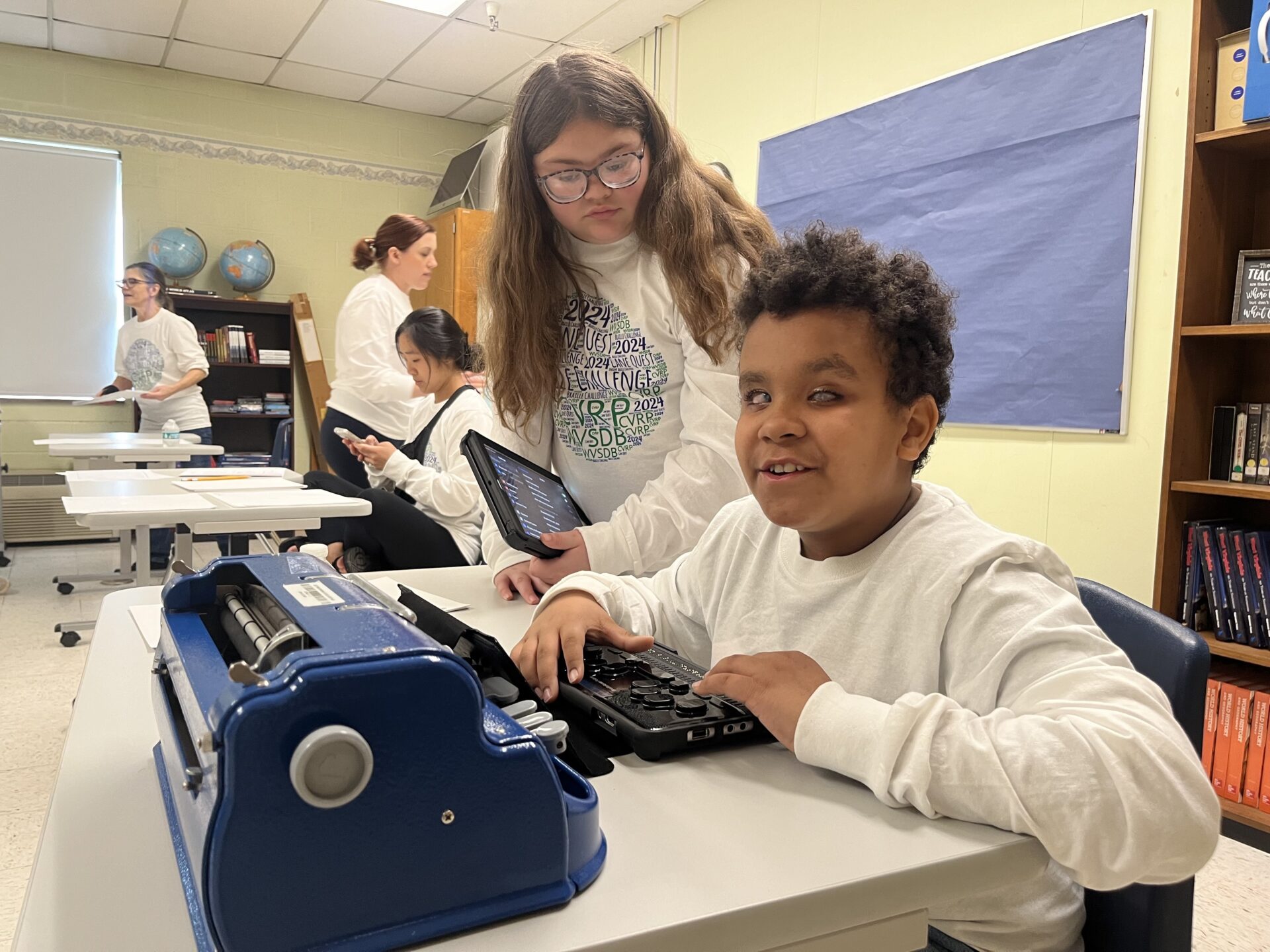March marked a special month for the West Virginia Schools for the Deaf and the Blind.
For the first time since the start of the COVID-19 pandemic, the schools opened their doors to children from across the state for a pair of school traditions placed on hiatus: the Braille Challenge and Cane Quest.
These competitions test children’s skills at reading and writing braille, and using mobility aids like canes to get around.
The Braille Challenge tests skills like reading comprehension, writing speed and accuracy.
In it, students read sheets of braille, and use a machine called a braille embosser to write and respond to questions. These embossers use pins and weights to indent a sheet of paper with braille.
Morgan DiPalma is a teacher at the Children’s Vision Rehabilitation Program (CVRP) in Morgantown, and organized this year’s Braille Challenge. She said group activities like these inspire kids to practice their skills.
“There’s different levels – different levels of kids, different needs,” she said. “Whatever level they’re at, we just encourage them to keep building off that.”
Nearly 40 students representing 11 different West Virginia counties competed in the challenges. Some attend the School for the Blind, and others stayed overnight at the campus in Romney after visiting from schools elsewhere in the state.
Photo Credit: Jack Walker/West Virginia Public Broadcasting
In addition to the Braille Challenge, kids also got to participate in Cane Quest. This challenge tests students’ ability to use canes as orientation and mobility devices.
Bethanie Mateer, an orientation and mobility specialist with the CVRP, organized this portion of the competition. She said people often don’t see the work that goes into learning how to use a cane – or how important a tool it can be.
“For the user themselves, it helps them detect drop off,” she said. “But again, that goes into learning how to use it and making sure you’re using it appropriately.”
Canes also signify to others when a person is blind, including fellow blind people who a cane user might encounter in public.
There are several barriers to accessible education for students with disabilities. Mateer said events like these can help amend gaps in traditional education resources.
“They work on technology. They work on independence. They work on self-advocacy, like learning skills,” she said.
For students, an added perk of participating in the Braille Challenge and Cane Quest is getting to meet other students who share their experiences.
“I get the braille, and I just get to hang with the people I love,” said Searra Kline, a high school student visiting campus to participate in this year’s challenge.
“Same here. I am so happy to get to see all of these people, because we live so far away from each other,” added her friend Kenzie Hayes, a middle school student visiting for the challenge. “It’s just so nice to get to see everybody.”
Photo Credit: Jack Walker/West Virginia Public Broadcasting
Based in Morgantown, the WVU Eye Institute works with students who are blind or have limited vision from across West Virginia. They also partner with the School for the Blind, and this year helped the school organize its challenge.
Director of Outreach Rebecca Coakley said that events like these are good at bringing youth together because, for many students, there are few times when they are in spaces where their experiences are shared with a majority of their peers.
“Kids who are blind and visually impaired are often isolated in their communities. Sometimes, they may be the only child in the county that’s totally blind,” she said.
“When they come to one of our events, there are kids just like them,” Coakley continued. “They get to be the people who help and provide assistance. So it really builds up their self-confidence, their self-esteem [and] their independence.”
Given all the benefits the event brings, Principal Melanie Hesse said she was excited to reopen the events to out-of-school students.
But she also said this year’s event was particularly bittersweet for the school community. One of the school’s orientation and mobility specialists who helped organize the event in the past, Matthew Stewart, died from COVID-19 in 2021.
The events, which spanned three days, ended with a ceremony open to parents and community members. During the ceremony, school administrators shared a video memorial for Stewart, and reminisced over stories of him.
For Hesse, these memories have only renewed the school community’s desire to continue hosting the Braille Challenge and Cane Quest, in order to carry on Stewart’s legacy in the years to come.
“It was always his baby,” she said. “We want to make sure that we honor his memory.”
